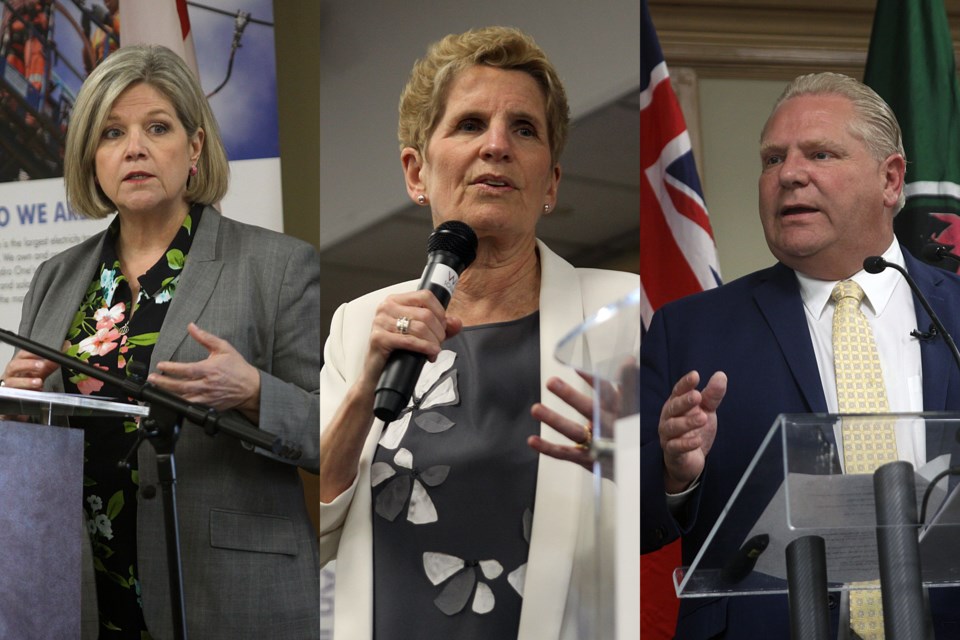PARRY SOUND, Ont. – The three leaders vying to be the next premier of Ontario are each adamant that the north will be a priority if their party forms the next government.
Liberal leader Kathleen Wynne, Progressive Conservative leader Doug Ford and NDP leader Andrea Horwath all made their case for the region at an hour-long northern leaders’ debate held Friday in Parry Sound at the Federation of Northern Ontario Municipalities conference.
This was the third consecutive provincial election campaign to have a dedicated northern issues debate but the first with all three hopefuls in attendance after previous Liberal leader Dalton McGuinty skipped in 2011 and former PC leader Tim Hudak was a no-show four years ago.
An early question asked the three premier hopefuls about their plans to develop the Ring of Fire.
Wynne, who during the 2014 campaign declared her first stint as premier would not be successful without meaningful development of the potentially lucrative remote mining opportunity, defended her government’s record.
“I made a commitment to you four years ago that we would get to the point by the time this term was ended that we would have an agreement and we would be moving forward with the infrastructure. That has happened,” Wynne said.
“That’s what the mining companies were looking for. We have an agreement with three communities – Webequie, Nibinamik and Marten Falls. The building of that infrastructure is starting. Planning is starting and shovels will be in the ground within the next few months.”
After having earlier this year pledged to personally hop on a bulldozer to build the road to the Ring of Fire, Ford responded that “there is a gold mine of minerals up there” but all that’s happened is talk.
“We’re going to work with the people in the north. We’re going to work with First Nations. We’re going to respect treaties in place right now. We’re going to get in there after everyone agrees. We’re going to go in there and start mining,” Ford said.
“We believe in resource revenue sharing. Any mining or forestry that comes out of the north right now it goes to Queen’s Park. It’s not going to happen under my watch. Those revenues are going to stay here in the north. I believe in letting the people of the north decide what they should do with their revenues.”
Horwath said there has been a great deal of frustration over what she called the “hold-up” in ensuring mining will eventually take place.
“We would be absolutely making sure the $1 billion we committed to last campaign is invested in building the infrastructure necessary with community agreements to ensure folks get the best benefit and communities are able to connect into that infrastructure,” Horwath said.
“We also want to keep the jobs in Ontario in the north when it comes to the minerals that are pulled out of the ground. We want to make sure the ferrochrome smelter is located in one your communities. We want to make sure people get decent jobs out of those minerals.”
The leaders were asked to address health care inequities in the north, a question that put both Ford and Wynne alternating between offence and defence.
Ford, who has been the subject of advertisements warning that he would slash nursing staff, listed a number of health care cuts under the Liberal government that included eight beds at Lake of the Woods Hospital and 26 full-time and part-time nursing positions at St. Joseph’s Hospital in Thunder Bay.
“When it comes to health care I hear the same story. You go in, there’s hallway health care. There’s wait times anywhere from six hours to 12 hours,” Ford said.
During a subsequent question Wynne later took aim at the late 1990s and early 2000s PC governments led by former premiers Mike Harris and Ernie Eves for transferring a number of responsibilities from the province to cities and towns, placing a burden on municipal property taxpayers.
“That uploading, downloading conversation as we’ve called it I think is ready for the next phase but there are billions of dollars of costs that have been taken off municipalities because we recognized that relationship between the province and municipalities had been so damaged by the previous government that it needed to be repaired and we needed to take those costs on,” Wynne said.
While Wynne was defending her government for making changes to legislation both for volunteer fire department regulations as well as Bill 148 to address what she called unintended consequences, Horwath jumped in that it’s the north that pays the price.
“I think the frustrating thing for northerners is that they’re always the unintended consequence. How many times have northerners had to be the unintended consequence?” Horwath charged.
“It shouldn’t be that northerners are not taken into consideration in advance of policy changes coming because that’s what the problem is. Too many times you’re left with decisions that have been made down south and they impact your communities in a way that’s not even thought out.”
The debate, the second between the trio this week, highlighted the third official day of the campaign. The provincial election will be held on June 7.
